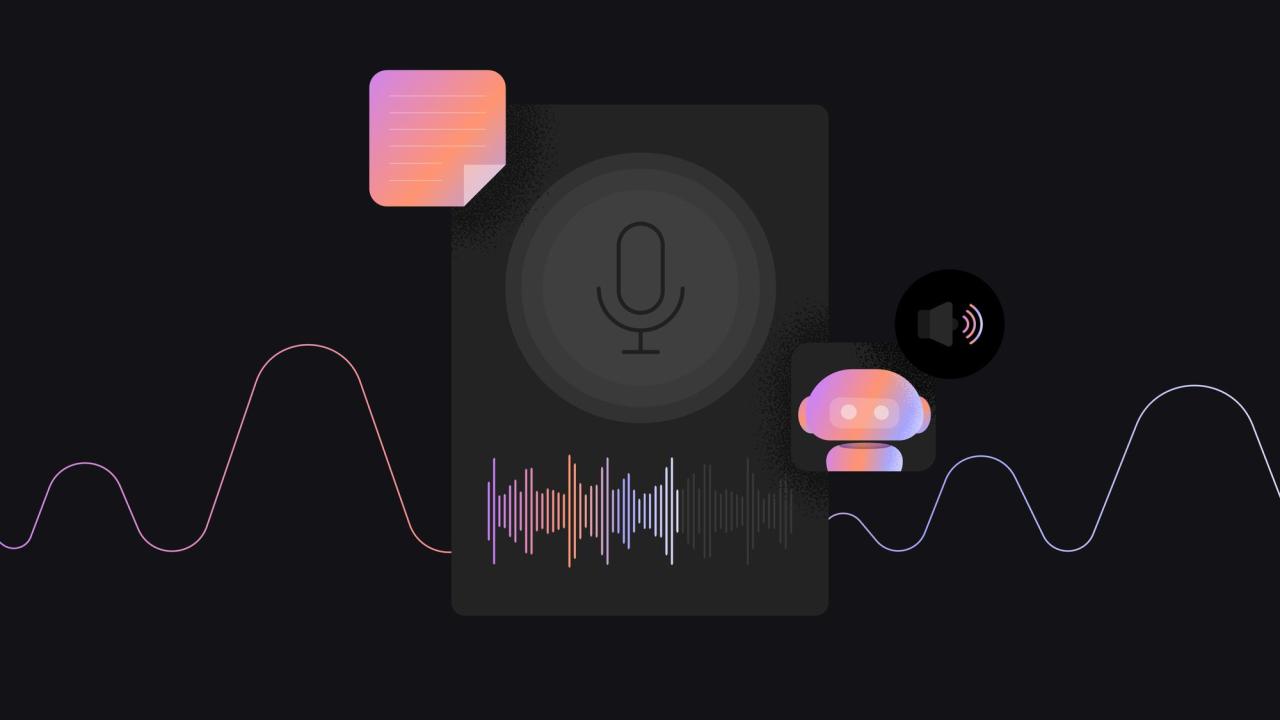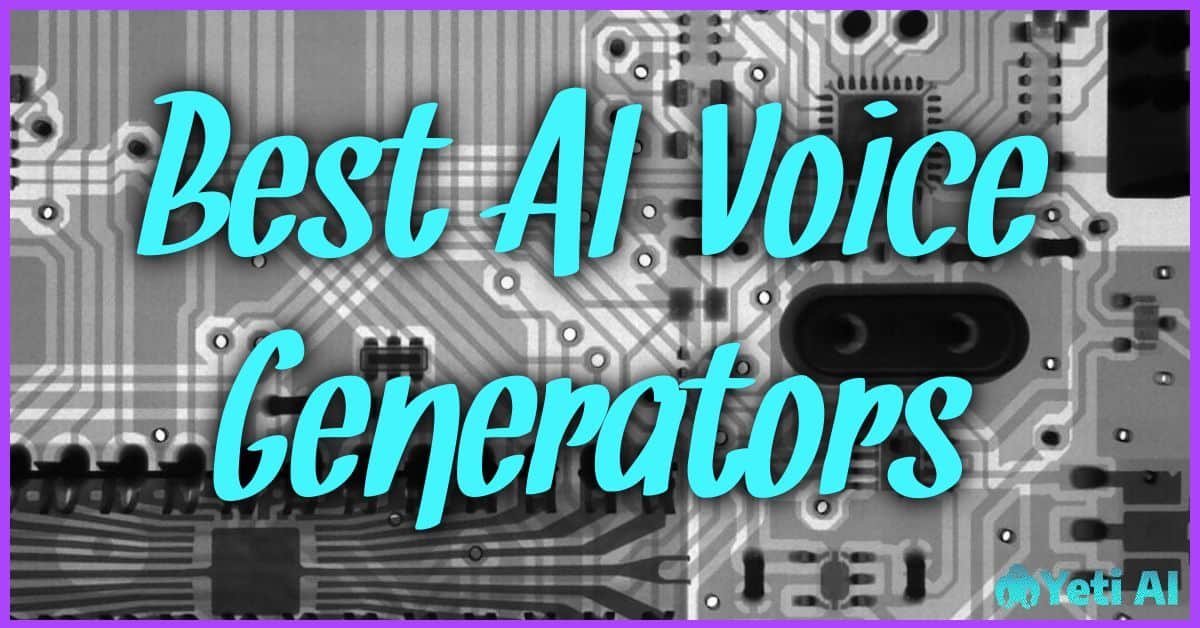Finding the right AI voice generator for podcasting is crucial for creating a professional and engaging listening experience. The right AI voice can significantly impact your podcast’s success, transforming your script into a captivating narrative. This guide helps you navigate the world of AI voice generators, covering everything from understanding your podcast’s needs to choosing the best software and considering ethical implications.
We’ll explore key features, voice quality, customization options, and integration with your existing workflow to ensure you find the perfect voice for your podcast.
We’ll delve into practical tips and techniques, comparing various AI voice generators and providing a step-by-step guide to integration. We’ll also address important considerations like cost, licensing, and ethical practices, ensuring you make informed decisions throughout the process. By the end, you’ll be equipped to select and implement an AI voice generator that elevates your podcast production.
Understanding Podcast Needs and AI Voice Generator Features
Choosing the right AI voice generator for your podcast hinges on understanding your specific needs and the capabilities of available tools. The ideal AI voice should seamlessly blend into your podcast’s narrative, enhancing the listening experience rather than distracting from it. Factors like genre, target audience, and overall podcast style significantly influence this choice.
The perfect AI voice isn’t just about clarity; it’s about conveying emotion and personality. Consider your podcast’s tone – is it serious and informative, humorous and lighthearted, or something in between? The AI voice should complement this tone and help maintain consistency throughout the episode. Think of your target audience as well: a younger demographic might appreciate a more modern, energetic voice, while an older audience might prefer a warmer, more authoritative tone.
Finding the right balance is key to engaging your listeners effectively.
AI Voice Generator Feature Comparison
Different AI voice generators offer varying levels of naturalness, expressiveness, and customization. Below is a comparison table highlighting key features of some popular options. Note that features and pricing can change, so always check the provider’s website for the most up-to-date information.
Picking the perfect AI voice for your podcast is key; you want something that sounds natural and engaging, right? Before you dive in, though, maybe take a quick break and check out How Many Episodes in Squid Game 2? – a fun distraction. Then, get back to choosing that perfect AI voice generator to really make your podcast shine!
| AI Voice Generator | Naturalness | Expressiveness | Customization Options |
|---|---|---|---|
| Murf.ai | High; often praised for sounding very human-like | Good; offers various emotional tones and speaking styles | Wide range of voices, languages, and fine-grained control over speed, pitch, and pauses |
| Descript | High; known for its clean and clear audio output | Moderate; focuses more on natural delivery than dramatic expression | Strong integration with other audio editing tools; allows for detailed script editing |
| ElevenLabs | Very High; frequently cited for its lifelike quality | High; allows for nuanced emotional expression | Multiple voice cloning options; advanced control over intonation and emphasis |
| Amazon Polly | Moderate to High; quality varies depending on the selected voice | Moderate; offers a range of voices with different personalities | Integrates well with AWS services; supports multiple languages |
Voice Tone and Style Consistency
Maintaining a consistent voice tone and style is crucial for a professional-sounding podcast. Inconsistent delivery can disrupt the flow and immersion of your podcast, making it feel less polished and potentially confusing to listeners. Imagine a podcast that shifts abruptly from a formal, authoritative tone to a casual, informal one within the same episode – it would likely feel jarring and unprofessional.
Therefore, choosing an AI voice that aligns with your overall podcast style and sticking with it consistently is paramount. This consistency builds trust and helps listeners connect with your brand or message more effectively.
Evaluating Voice Quality and Naturalness

Choosing the right AI voice for your podcast hinges on how natural and clear the generated speech sounds. A robotic or unnatural voice can quickly alienate listeners, while a clear, engaging voice keeps them hooked. This section will help you assess voice quality and identify the perfect fit for your podcast’s style and audience.Let’s dive into how to evaluate the naturalness and clarity of different AI voices, focusing on practical methods and examples.
Examples of AI Voices and Their Characteristics
The quality of AI voices varies significantly across different platforms and providers. Some excel in naturalness, while others prioritize clarity or speed. Understanding these differences is crucial for selecting the best option for your podcast.
- Voice A (Example: A text-to-speech voice from a well-established platform): This voice often boasts high clarity, with excellent pronunciation and intonation. However, it might lack the subtle nuances and emotional inflection of a human voice, potentially sounding slightly monotone in longer passages. It’s a good choice for factual content or instructional podcasts where clarity is paramount.
- Voice B (Example: A more recently developed AI voice emphasizing naturalness): This voice aims for a more conversational and expressive tone. While its clarity might be slightly less perfect than Voice A, it compensates with a more engaging and less robotic feel. It might be better suited for narrative podcasts or interviews where a warmer, more human-like delivery is preferred.
- Voice C (Example: A voice with a noticeable accent): Using a voice with a specific accent can add character and authenticity to your podcast, depending on your content and target audience. However, ensure the accent is clear and doesn’t hinder comprehension. A strong, well-pronounced accent can work well, but a heavily distorted or unclear accent could be detrimental.
Impact of Audio Settings and Parameters
Beyond the inherent characteristics of the AI voice itself, various audio settings and parameters significantly influence the perceived quality. Fine-tuning these settings can transform a decent voice into a truly exceptional one.The most impactful parameters typically include:
- Speech Rate: Adjusting the speed of speech can significantly impact listener engagement. Too fast, and listeners might struggle to keep up; too slow, and they might find it tedious. Experiment to find the optimal pace for your content.
- Pitch and Tone: Subtle adjustments to pitch and tone can add emotional depth and expression to the AI voice. A slightly higher pitch might suit a more energetic podcast, while a lower pitch might work better for a more serious or contemplative one.
- Volume and Emphasis: Controlling volume and emphasis allows you to highlight key words or phrases, improving clarity and engagement. Strategic use of emphasis can mimic the natural emphasis a human speaker would use.
A/B Testing Method for AI Voice Selection
To objectively compare different AI voices, implement a structured A/B testing approach.
1. Select a representative sample of your podcast script
Choose a section that encompasses the variety of tones and styles typical of your podcast.
2. Generate the sample using different AI voices and settings
Use each voice with several different parameter settings (e.g., different speech rates, pitches).
Picking the perfect AI voice for your podcast can be tricky! You want something engaging, right? Think about how much impact a voice can have – like the unforgettable presence of Lee Byung-hun in Korean cinema, a true icon you can learn more about here: Lee Byung-hun A Korean Cinema Icon. Just like a great actor, the right AI voice will elevate your podcast and keep listeners hooked.
So, take your time and experiment to find the perfect fit!
3. Blindly evaluate the samples
Gather feedback from a small group of listeners, ensuring they don’t know which voice is which. Ask them to rate the voices based on naturalness, clarity, and overall engagement.
4. Analyze the results
Identify the voice and settings that receive the most positive feedback. This provides a data-driven approach to choosing the best AI voice for your podcast.
Exploring Customization Options and Text-to-Speech Capabilities: Finding The Right AI Voice Generator For Podcasting

Choosing the right AI voice generator for your podcast hinges significantly on its customization options and how well it translates text into natural-sounding speech. The level of control you have over the voice’s characteristics and the generator’s ability to handle complex language directly impacts the quality and professionalism of your final product.
Different AI voice generators offer varying degrees of customization. You’ll find options to adjust parameters like speaking rate, pitch, and tone to create a unique sonic identity for your podcast. Beyond basic adjustments, many platforms allow for more nuanced control over the voice’s emotional expression, adding inflection and emphasis to create a more engaging listening experience. Understanding these capabilities is crucial for achieving the desired tone and style for your podcast.
Voice Style, Intonation, and Emotion Control
Customization options often extend beyond simple speed and pitch adjustments. Many advanced AI voice generators provide granular control over the voice’s style, allowing you to select from various presets such as “friendly,” “authoritative,” or “conversational.” This helps tailor the voice to match the content and intended audience. Intonation control allows you to fine-tune the rise and fall of the voice’s pitch, mimicking natural speech patterns.
Finally, some generators offer control over emotional expression, allowing you to inject enthusiasm, sadness, or seriousness into the AI’s delivery. For instance, you might choose a more upbeat tone for a comedic podcast or a more serious tone for a news-focused one. Experimentation is key to discovering the optimal settings for your specific needs.
Picking the perfect AI voice for your podcast is key; you want something engaging and professional. While you’re figuring that out, you might be wondering, “Okay, but When is Season 3 of Squid Game? ,” because let’s be honest, we all need a break sometimes! Once you’ve satisfied your K-drama cravings, get back to choosing that AI voice – it’ll make your podcast sound amazing.
Using Punctuation and Formatting for Delivery Control
Beyond the pre-set options, you can significantly influence the AI voice’s delivery through careful use of punctuation and text formatting. Proper punctuation—commas, periods, exclamation points—directly impacts pacing and intonation. Similarly, formatting elements like bolding, italics, and capitalization can signal emphasis. For example, using bold text might cause the AI to pronounce a word or phrase with more force, while italics might create a softer, more subtle emphasis.
These simple techniques can dramatically enhance the naturalness and expressiveness of your AI-generated narration. Consider using all caps sparingly, as overuse can sound unnatural or even aggressive. The key is subtle and strategic use for maximum impact.
Text-to-Speech Capabilities and Handling Complex Language
The effectiveness of an AI voice generator also rests on its ability to handle complex sentences and linguistic nuances. Some generators struggle with long, convoluted sentences, producing unnatural pauses or misinterpretations. Others excel at handling sophisticated grammar and vocabulary, delivering smooth, natural-sounding speech even with complex linguistic structures. Look for generators that offer robust natural language processing (NLP) capabilities to ensure accurate and fluent speech generation, even with idiomatic expressions or figurative language.
Consider testing the generator with a sample of your own podcast script to assess its performance before committing to a subscription.
Picking the perfect AI voice for your podcast can be tricky! You want something that sounds natural and engaging, right? To stay updated on the latest audio tech advancements, check out cool stuff like this website for news technology: news technology. Knowing what’s new helps you choose a generator that uses the most current and high-quality AI voices, ensuring your podcast sounds amazing.
Integration with Podcasting Workflow and Software

Integrating an AI voice generator into your podcast workflow can significantly streamline your production process, allowing you to create episodes more efficiently. This involves understanding how the AI generator interacts with your existing editing software and potentially incorporating new tools to enhance the overall experience. The key is to find a seamless integration that doesn’t add unnecessary complexity.Successfully integrating an AI voice generator requires a thoughtful approach.
You need to consider where the AI voice generation fits within your existing podcast production pipeline, from script writing to final audio mastering. Choosing the right software and understanding potential compatibility issues are also crucial steps. This section will guide you through the process, offering practical advice and recommendations.
Step-by-Step Guide to Integrating an AI Voice Generator
This guide Artikels a typical workflow, assuming you’ve already chosen your AI voice generator and have a script ready. Adapt these steps to your specific needs and software.
- Script Preparation: Ensure your script is clean, well-formatted, and free of errors. Many AI generators perform better with properly punctuated and structured text. Consider using a scriptwriting software for better organization and formatting. This initial step significantly impacts the quality of the generated audio.
- AI Voice Generation: Paste your script into the AI voice generator. Select your preferred voice, adjust settings like speed and tone, and initiate the generation process. Most generators provide options for downloading the audio in various formats (e.g., MP3, WAV).
- Audio Editing and Integration: Import the generated audio file into your podcast editing software (e.g., Audacity, Adobe Audition, GarageBand). Edit the audio as needed – this may include adding music, sound effects, transitions, and removing any imperfections or unwanted segments.
- Mixing and Mastering: Mix the AI-generated voice with other audio elements, ensuring balanced levels and a professional sound. Mastering involves final adjustments to optimize the audio for various playback platforms. Proper mixing and mastering are critical for a polished final product.
- Export and Distribution: Export your completed podcast episode in a suitable format (e.g., MP3) and distribute it through your chosen podcast hosting platform.
Challenges and Solutions in Software Integration
Different podcast editing software may have varying levels of compatibility with AI-generated audio. Some common challenges include:
- File Format Compatibility: Ensure your chosen AI voice generator outputs audio files compatible with your editing software. Common formats like MP3 and WAV are generally well-supported.
- Software Plugin Compatibility: Some AI voice generators offer plugins for direct integration into editing software. However, this isn’t always the case. You may need to work with imported audio files.
- Audio Quality Issues: While AI voice generation technology is constantly improving, occasional artifacts or inconsistencies in audio quality might require additional editing or processing within your podcast software. Experiment with different settings in both the AI generator and your editing software to optimize audio quality.
Recommended Software and Plugins
Choosing the right tools can significantly improve your workflow. Here’s a list of commonly used software and plugins that enhance the process:
- Audacity: A free, open-source audio editor with a large user base and extensive community support. It’s versatile and handles various audio file formats.
- Adobe Audition: A professional-grade audio editing software offering advanced features and precise control over audio manipulation. It’s ideal for high-quality podcast production.
- GarageBand: Apple’s free audio editing software, user-friendly and well-suited for beginners. It’s pre-installed on macOS and iOS devices.
- Descript: A collaborative audio and video editing platform that also includes transcription and AI-powered features. It can streamline the entire podcast production process.
- (Note: Specific plugins for AI voice generators vary greatly depending on the generator itself and are not consistently available across all editing software.) Always check the AI voice generator’s documentation for compatibility information and recommended plugins.
Cost and Licensing Considerations
Choosing the right AI voice generator for your podcast involves careful consideration of not just the voice quality, but also the financial implications and licensing restrictions. Understanding the pricing models and licensing agreements will help you budget effectively and ensure your podcast complies with usage rights.Pricing models vary widely, ranging from free plans with limitations to substantial monthly or annual subscriptions.
Licensing agreements dictate how you can use the generated audio, impacting your podcast’s distribution and potential for monetization. Let’s delve into the specifics.
AI Voice Generator Pricing Models
Different AI voice generators offer diverse pricing structures. Generally, you’ll encounter free tiers, offering limited usage, and paid plans with increasing features and usage allowances. The following table illustrates a typical breakdown, though specific features and costs will vary between providers. Remember these are examples and may not reflect current pricing.
| Pricing Tier | Monthly Cost (USD) | Audio Generation Limits (minutes) | Features |
|---|---|---|---|
| Free | $0 | 10-30 | Basic voices, limited customization, watermarking |
| Basic | $10-20 | 100-500 | More voices, some customization, watermark removal |
| Premium | $50-100+ | Unlimited or very high limits | All voices, advanced customization, priority support, high-quality audio |
Licensing Agreements and Their Impact, Finding the right AI voice generator for podcasting
The licensing agreement associated with an AI voice generator dictates how you can legally use the generated audio. Some licenses might allow for commercial use and distribution across various platforms, including podcasting apps and monetized channels. Others may restrict usage to non-commercial purposes or limit distribution channels. A restrictive license could severely hamper your podcast’s growth if you plan to monetize it through ads or sponsorships.
Always review the license agreement thoroughly before committing to a service.
Calculating Total Cost for Podcast Production
Estimating the total cost of using an AI voice generator requires careful planning. Consider the following factors:
- Subscription Fee: The monthly or annual cost of your chosen plan.
- Usage Limits: If your plan has usage limits (e.g., minutes of audio generation per month), accurately estimate your podcast’s audio needs to avoid exceeding the limits and incurring extra charges.
- Additional Features: Costs associated with extra features like advanced voice customization or priority support.
- One-time Costs: Some providers may charge setup fees or one-time costs for specific features.
For example, let’s say you choose a premium plan costing $75 per month with unlimited audio generation. Your total annual cost would be $900. However, if you opted for a basic plan at $20 per month with a 200-minute limit, and your podcast requires 300 minutes of audio per month, you would need to either upgrade or pay extra for exceeding your limit.
Accurate estimation of your audio needs is crucial for budget management.
Total Cost = (Monthly Subscription Fee x Number of Months) + Additional Feature Costs + One-time Costs
Addressing Ethical and Legal Implications
Using AI voice generators for podcasting offers exciting possibilities, but it’s crucial to navigate the ethical and legal landscape responsibly. Ignoring these considerations can lead to reputational damage, legal disputes, and erode listener trust. This section explores the key ethical and legal aspects to consider when incorporating AI voices into your podcast.
Authenticity and Transparency
Transparency is paramount. Listeners deserve to know when they’re hearing a human voice versus an AI-generated one. Failing to disclose the use of AI can be deceptive and damage your credibility. For example, imagine a podcast discussing sensitive topics where the AI voice is presented as a human expert. This could lead to significant ethical problems, including a misrepresentation of expertise and potentially influencing listener decisions based on a false premise.
Best practice dictates clearly stating in your podcast description or at the beginning of each episode that AI voice technology is being used, along with a brief explanation of why. This proactive approach builds trust and fosters a more responsible use of the technology.
Copyright and Intellectual Property
The legal landscape surrounding AI-generated voices and copyright is still evolving. Using AI voices to impersonate someone without their permission, or using copyrighted material in the training data of the AI voice generator, can lead to legal challenges. For example, using an AI voice that sounds remarkably like a famous actor to narrate your podcast without their consent is a clear violation of their likeness rights.
Similarly, if the AI voice generator was trained on copyrighted audio material without proper licensing, using the output could infringe on copyright. To mitigate this risk, it’s vital to use AI voice generators that have clear licensing agreements and ensure that you have the rights to use any audio content incorporated into your podcast. Consult with legal professionals specializing in intellectual property law to ensure compliance.
Best Practices for Ethical and Responsible Use
Adopting a proactive approach to ethical considerations is crucial. This includes obtaining informed consent whenever using a voice that closely resembles a real person, even if it’s not a direct impersonation. Always clearly label AI-generated content to avoid misleading your audience. Furthermore, carefully review the terms of service and licensing agreements of your chosen AI voice generator to understand the permissible uses and limitations.
Consider also the potential impact on human voice actors; while AI voices offer new opportunities, they also represent a potential disruption to traditional voice acting roles. A responsible approach acknowledges this and seeks to find a balance that benefits both human and AI-driven voice production.
Wrap-Up

Selecting the perfect AI voice generator for your podcast is a journey that requires careful consideration of various factors. From understanding your target audience and podcast genre to evaluating voice quality, exploring customization options, and integrating the chosen AI into your workflow, each step plays a crucial role in achieving a polished and professional sound. Remember to always prioritize ethical considerations and legal compliance.
By following the advice in this guide, you’ll be well on your way to creating a compelling and engaging podcast experience using the power of AI voice generation.
General Inquiries
What are the common file formats supported by AI voice generators?
Many support MP3, WAV, and sometimes others like OGG. Check the specific generator’s specifications.
How do I handle accents and dialects using an AI voice?
Some generators offer specific voice options for different accents. If not, carefully select a voice with a neutral accent to avoid misinterpretations.
Can I use an AI voice for commercial purposes?
Always check the licensing agreement. Some allow commercial use; others might require additional fees or specific permissions.
What’s the best way to edit an AI-generated voice?
Most standard audio editing software (Audacity, Adobe Audition, etc.) work well. Look for features like noise reduction and compression.